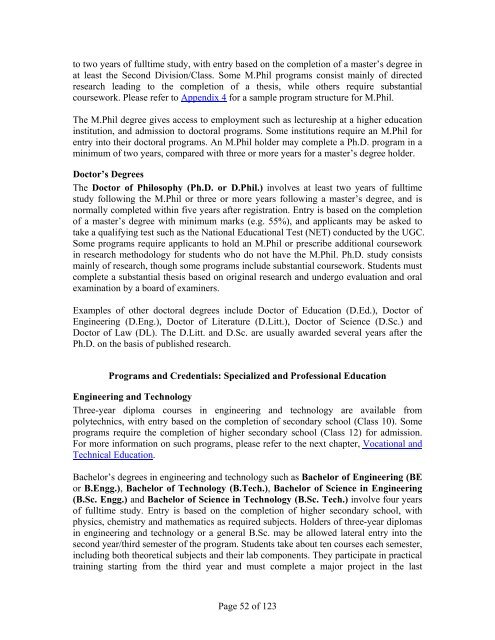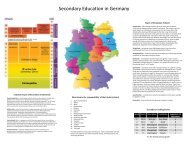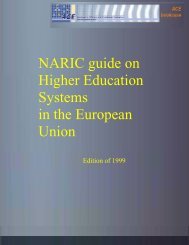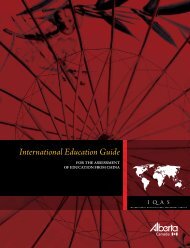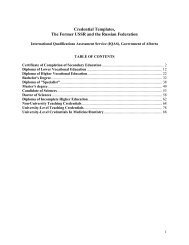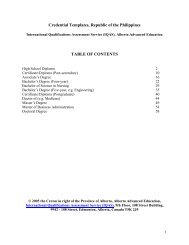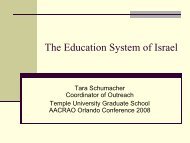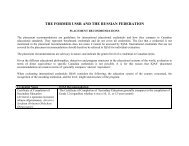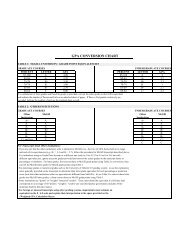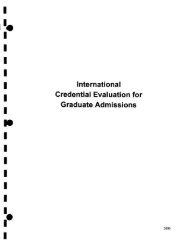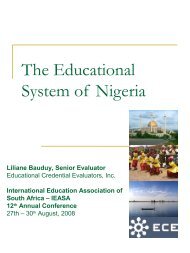International Qualifications Assessment Service (IQAS) - Shelby ...
International Qualifications Assessment Service (IQAS) - Shelby ...
International Qualifications Assessment Service (IQAS) - Shelby ...
You also want an ePaper? Increase the reach of your titles
YUMPU automatically turns print PDFs into web optimized ePapers that Google loves.
to two years of fulltime study, with entry based on the completion of a master’s degree in<br />
at least the Second Division/Class. Some M.Phil programs consist mainly of directed<br />
research leading to the completion of a thesis, while others require substantial<br />
coursework. Please refer to Appendix 4 for a sample program structure for M.Phil.<br />
The M.Phil degree gives access to employment such as lectureship at a higher education<br />
institution, and admission to doctoral programs. Some institutions require an M.Phil for<br />
entry into their doctoral programs. An M.Phil holder may complete a Ph.D. program in a<br />
minimum of two years, compared with three or more years for a master’s degree holder.<br />
Doctor’s Degrees<br />
The Doctor of Philosophy (Ph.D. or D.Phil.) involves at least two years of fulltime<br />
study following the M.Phil or three or more years following a master’s degree, and is<br />
normally completed within five years after registration. Entry is based on the completion<br />
of a master’s degree with minimum marks (e.g. 55%), and applicants may be asked to<br />
take a qualifying test such as the National Educational Test (NET) conducted by the UGC.<br />
Some programs require applicants to hold an M.Phil or prescribe additional coursework<br />
in research methodology for students who do not have the M.Phil. Ph.D. study consists<br />
mainly of research, though some programs include substantial coursework. Students must<br />
complete a substantial thesis based on original research and undergo evaluation and oral<br />
examination by a board of examiners.<br />
Examples of other doctoral degrees include Doctor of Education (D.Ed.), Doctor of<br />
Engineering (D.Eng.), Doctor of Literature (D.Litt.), Doctor of Science (D.Sc.) and<br />
Doctor of Law (DL). The D.Litt. and D.Sc. are usually awarded several years after the<br />
Ph.D. on the basis of published research.<br />
Programs and Credentials: Specialized and Professional Education<br />
Engineering and Technology<br />
Three-year diploma courses in engineering and technology are available from<br />
polytechnics, with entry based on the completion of secondary school (Class 10). Some<br />
programs require the completion of higher secondary school (Class 12) for admission.<br />
For more information on such programs, please refer to the next chapter, Vocational and<br />
Technical Education.<br />
Bachelor’s degrees in engineering and technology such as Bachelor of Engineering (BE<br />
or B.Engg.), Bachelor of Technology (B.Tech.), Bachelor of Science in Engineering<br />
(B.Sc. Engg.) and Bachelor of Science in Technology (B.Sc. Tech.) involve four years<br />
of fulltime study. Entry is based on the completion of higher secondary school, with<br />
physics, chemistry and mathematics as required subjects. Holders of three-year diplomas<br />
in engineering and technology or a general B.Sc. may be allowed lateral entry into the<br />
second year/third semester of the program. Students take about ten courses each semester,<br />
including both theoretical subjects and their lab components. They participate in practical<br />
training starting from the third year and must complete a major project in the last<br />
Page 52 of 123


